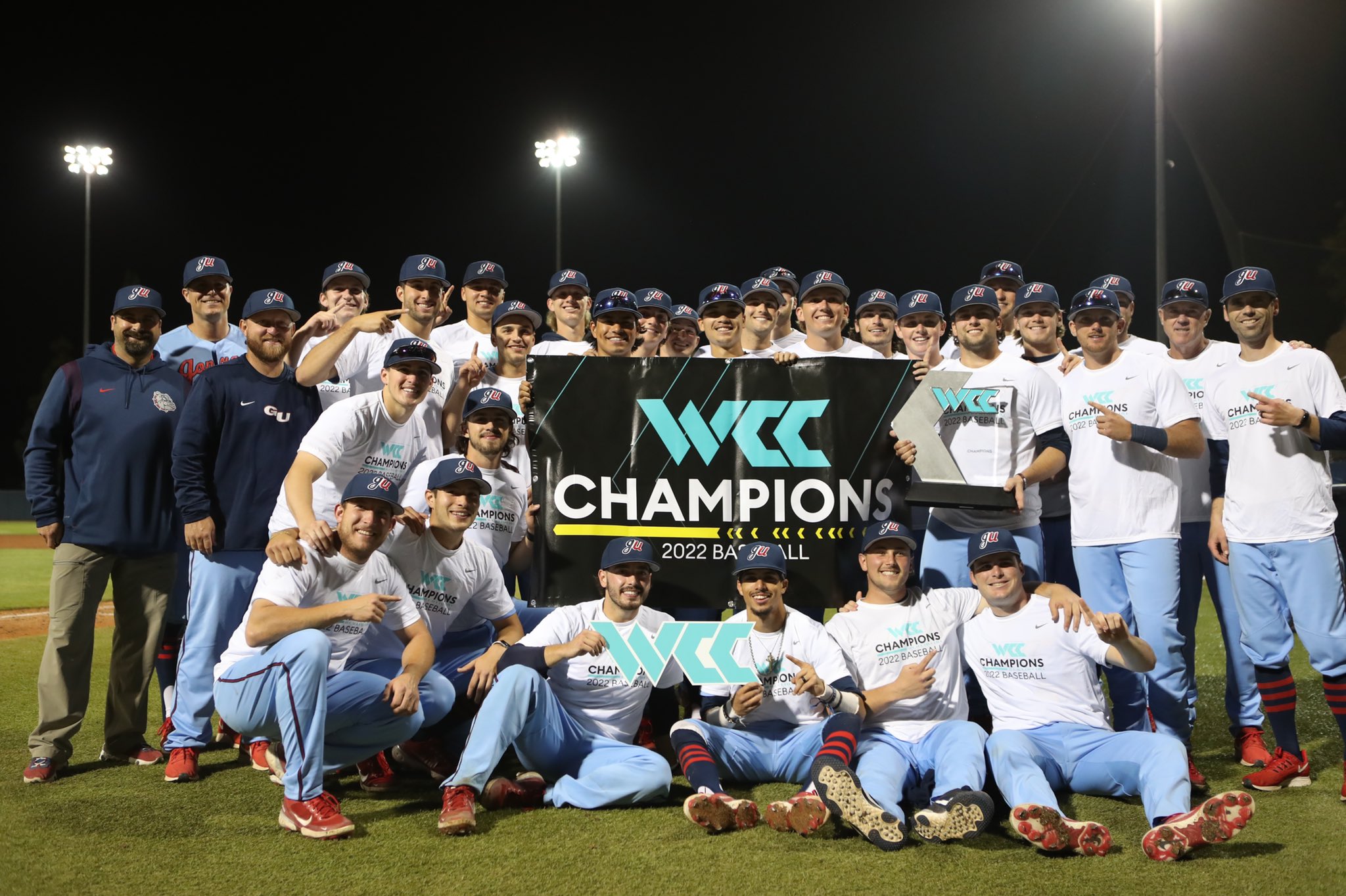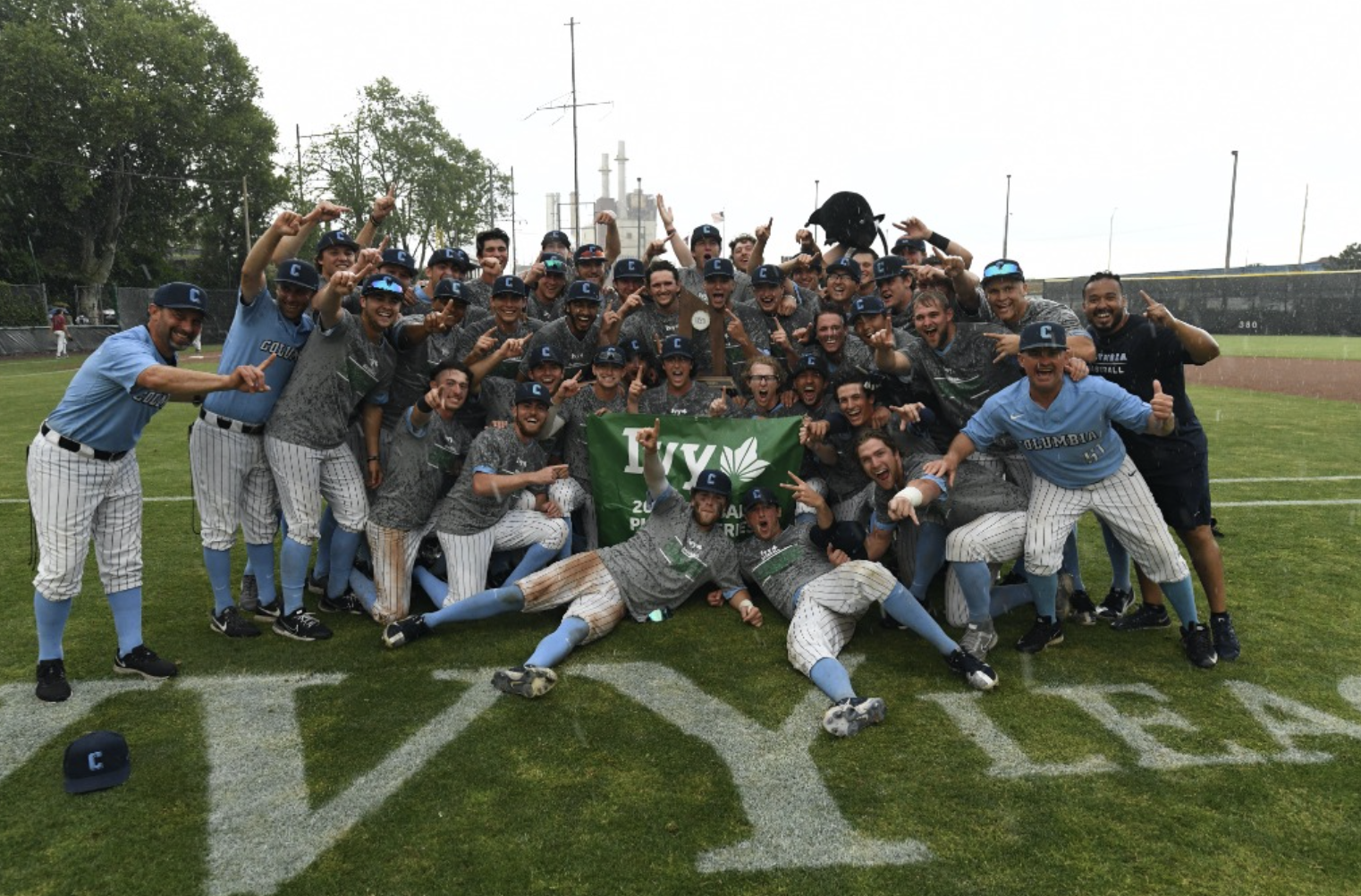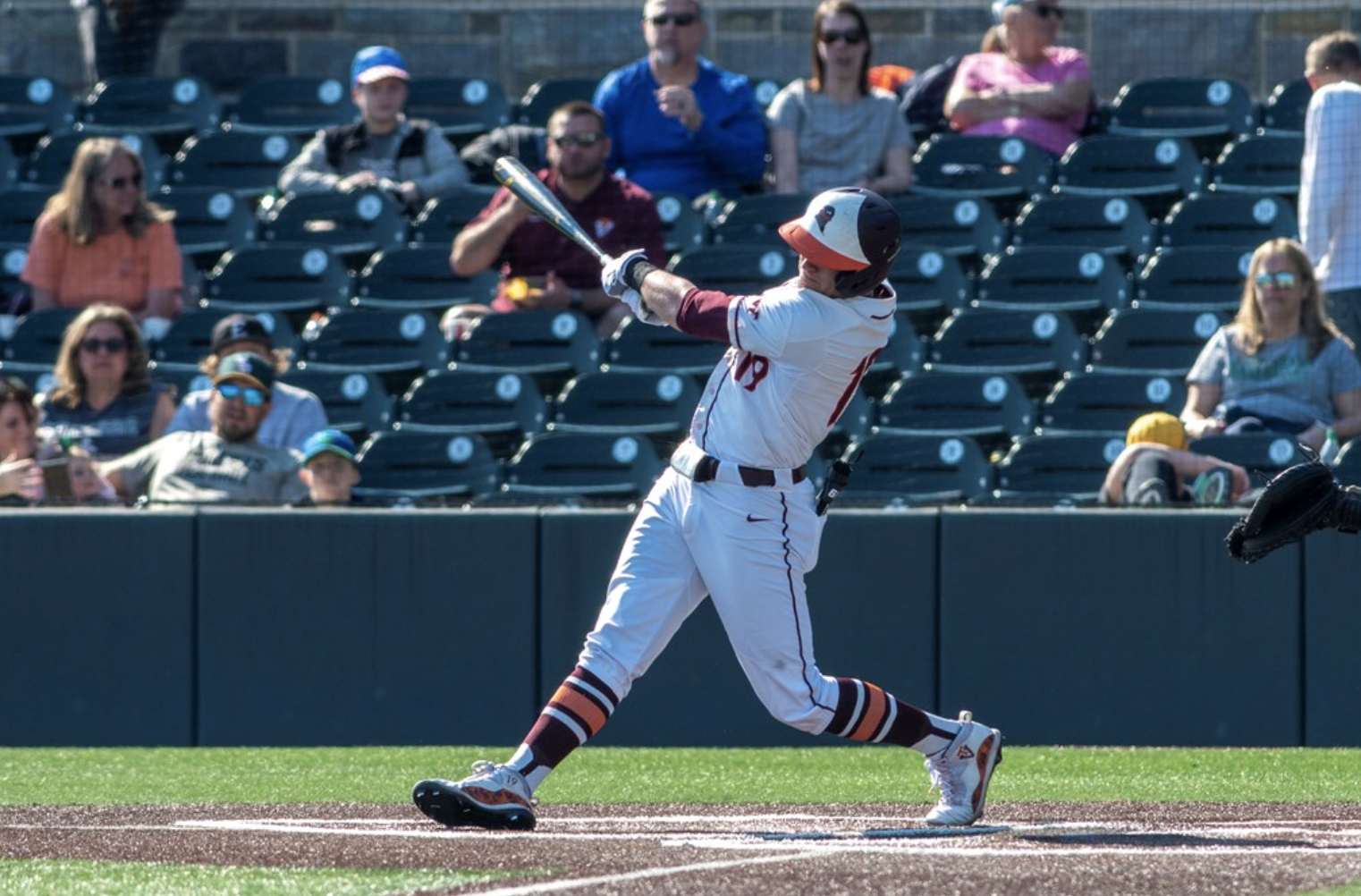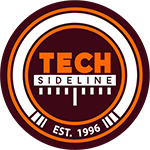
If you had told some players that No. 4 Virginia Tech would be in position to have home-field advantage through the Super Regionals before the season began, they might not have believed you.
But that’s the exact place the Hokies (41-12) are in right now as they prepare to host Blacksburg’s first NCAA Regional since 2013 – the first time in the John Szefc era. It all begins on Friday night at 7 p.m. against Horizon League champion Wright State (30-25) on the ACC Network. It follows the first game of the day – Ivy League champion Columbia (No. 3 seed) and Gonzaga (No. 2 seed) – that’ll be played at 1 p.m. on ESPN+.
Regional play continues on Saturday and Sunday – potentially Monday if necessary – in a double-elimination format:
Friday, June 3:
Game 1, 1 p.m., ESPN+: Gonzaga vs. Columbia
Game 2, 7 p.m., ACCN: Virginia Tech vs. Wright State
Saturday, June 4:
Game 3, 1 p.m.: Loser Game 1 vs. Loser Game 2
Game 4, 7 p.m.: Winner Game 1 vs. Winner Game 2
Sunday, June 5:
Game 5, 1 p.m.: Winner Game 3 vs. Loser Game 4 (Final of Loser’s Bracket)
Game 6, 7 p.m.: Winner Game 4 vs. Winner Game 5 (Regional Final)
Monday, June 6:
Game 7, 7 p.m.: A second Regional Final, if necessary
For more details on the layout of the Blacksburg Regional, along with ticket and game day information, click here.
Game four on Saturday between the two winners from Friday is the crucial game. Whichever team falls in that game drops down to the loser’s bracket and must win its way out on Sunday before playing in the Regional Final later that afternoon. And to advance to the NCAA Super Regional, that team must win twice (i.e. three straight games in 36 hours).
Virginia Tech’s Approach
After falling to 0-4 in ACC play to begin the conference schedule, Virginia Tech ripped off 19 wins in its last 24 conference games to finish with the best record in the ACC (19-9). It won the Coastal Division title after it was projected to finish sixth by the ACC’s coaches before the season began.
Tech left the ACC Tournament in Charlotte with a 1-1 record after mauling Clemson (12-1), but was given a taste of its own medicine in what Szefc called “the worst loss of the season” – a 10-0 loss to the eventual-champion North Carolina.

“We just had one bad game… It’s part of baseball,” junior outfielder Gavin Cross told reporters after the NCAA’s selection show on Monday afternoon. “But just knowing that we’re in Blacksburg the rest of the year and playing in front of our fans and playing together, it should be fun. UNC was hot and they played a lot better than us. It’s part of it. Their guy threw really well and we didn’t pitch very well and it kind of just all came together. They beat us pretty bad.”
Last year, Tech was shutout in its season-ending loss to Notre Dame in the ACC Tournament. This season, however, there’s a lot more baseball left for the Hokies to play, starting on Friday night.
The Blacksburg Regional will feature three offensive-heavy teams (Virginia Tech, Wright State and Columbia) and a team that relies heavily on pitching and defense (Gonzaga – who was No. 14 in D1 Baseball’s latest Top 25 poll). Soon after the selection show concluded on Monday, D1Baseball managing editor Kendall Rodgers Tweeted that Tech has “a pretty favorable draw. … But keep an eye on [Gonzaga]. The [Zags] have the arms to win that regional.”
Virginia Tech clearly has the most complete offense in the regional – it’s arguably the second-best offense in the nation behind No. 1 Tennessee – with no easy outs anywhere in the lineup. Seven of its starters are hitting over .300 – Jack Hurley, Tanner Schobel, Nick Biddison, Carson DeMartini, Cade Hunter and Carson Jones – while Eduardo Malinowski (.266 season average) crushed non-conference pitching (.302 with eight homers) throughout the year.
But the regional might end up coming down to the pitching. Throughout the season, the Hokies had two front-end starters in Griffin Green and Drue Hackenberg but struggled finding a Sunday starter until Jordan Geber filled the void halfway through the season once he completed his comeback from a preseason concussion.
Gonzaga (36-17, 20-7 WCC)
Gonzaga finished the West Coast Conference season with the best record (20-7) and earned the No. 1 seed in the WCC Tournament before it was upset by No. 3 San Diego in the championship game. The Zags have recent NCAA Tournament history after being the No. 2 seed in last year’s Eugene Regional.
The Bulldogs beat LSU in the first game of the regional before falling to host Oregon in the winner’s bracket and losing to LSU in the consolation final. Current pitchers – reliever Michael Spellacy (2.19 ERA in 21 appearances and William Kempner (0.81 ERA in seven starts) – have postseason experience, something Virginia Tech does not.
Gonzaga finished the season at No. 27 in RPI (Virginia Tech sits at No. 5) with a 6-8 record against Quad 1 teams. It split four games (a pair of two-game series) with No. 3 Oregon State during the regular season and swept No. 6 Oklahoma State in early March.
Four hitters in Gonzaga’s lineup are hitting over .295 on a team that likes to manufacture runs – only hitting 37 home runs during the season with a .404 slugging percentage (for reference, Tech’s is .570, good for second in the nation). Only two players hit more than five home runs – Cade McGee had 10 and Tyler Rando hit seven – while Virginia Tech had seven players hit 10 or more.

Gonzaga, though, will only go as far as its arms take it. Its two front-end weekend starters – Kempner and Gabriel Hughes (2.84 ERA in 92 innings with 131 strikeouts) – boast some of the best stuff Tech will likely see all year. Hughes was named a First Team All-American by Collegiate Baseball on Thursday. And its Sunday starter, Trystan Vrieling (4.44 ERA in 79 innings with 104 strikeouts), is no joke, either.
Tech, though, hasn’t had much trouble hammering some of the nation’s top pitchers all season. The Hokies tagged John Michael Bertrand (Notre Dame) for three runs in 5 ⅔ innings; then Connor Bovair (North Carolina) for six runs in 3 ⅔ innings; Logan Whitaker (NC State) surrendered nine runs in four innings; Carson Palmquist (Miami) yielded six runs in 3 ⅓ in mid-April; and finally Nate Savino (Virginia) gave up three runs in 5 ⅔.
The common theme among the five? All Friday night starters for ranked teams that Virginia Tech beat on its way to nine-straight series wins to close out the regular season.
Throughout the spring, the Hokies crushed just about any starter that had a considerable amount of film to study. Their approach worked against some of the ACC’s best, and that same routine could work against some of the WCC’s best in a hitter-friendly English Field.
The Hokies like to run (71-87 on steals this season) and the Zags have some trouble throwing runners out, only nabbing 16 of the 55 stolen base attempts.
Columbia (30-16, 17-4 Ivy League)
Like Tech, Columbia is no slouch on offense. The Lions are led by seven starters – Cole Hage, Hayden Schott, Tyler MacGregor, Anton Lazits, Andy Blake, Weston Eberly and EJ Jreutzmann – that are hitting above .300, albeit playing Ivy League competition for the majority of the season. They ripped off the nation’s longest winning streak at one point – 19 games – after taking the past two years off due to the pandemic.
Columbia was good enough to claim the regular season title and the Ivy League Tournament title. It was 15-2 at home, but on the road? Just 15-14 – respectable, but likely hasn’t played in front of a regional-type crowd Virginia Tech will bring in this weekend.

The Lions had three players hit 10 or more home runs while six drove in 30 or more runs. Hayden Schott leads the way on offense with a .331 average and a team-leading 11 homers and 50 RBIs. Cole Hage hit a team-high .343 with a .542 slugging percentage.
They like to run, too. Columbia was successful in 72 of its 90 stolen base attempts this season (76.1%) and was relatively clean in the field with 52 errors.
On the pitching side, Andy Leon leads the way with a 3.99 ERA in eight starts (29 ⅓ innings), while Joe Sheets (5.79 ERA in 10 starts) and Sean Higgins (5.96 ERA in 10 starts) can keep Columbia in games if its offense can keep up.
Wright State (30-25, 20-9 Horizon League)
The No. 4 seed in the regional, Wright State has some recent history with Virginia Tech. The Raiders traveled to Blacksburg in early March and ran away with the Friday game in an 11-5 win in which Griffin Green yielded six runs in two innings. But Virginia Tech stormed back with wins on Saturday (9-3) and Sunday (17-1) to take the series.
Ryan Okuda, who has since been moved out of the weekend rotation, gave Tech five innings of two-run (one earned) ball in game two. Drue Hackenberg’s first true test came on Sunday and he lived up to the task, and he set up his success to run away with the ACC’s regular season ERA title (2.44). He shoved for seven innings, allowing five hits and a run in his final inning. The freshman struck out six en route to the 16-run victory.
“We got beat by them bad that Friday,” Szefc said on Monday. “They’ve seen us before; we’ve seen them, too. They’ve also been here, which is going to be helpful for them. You got to go out there and play well. When you get to this stage in the postseason, you got to play well. Got to pitch, got defend well, got to do everything well.”
Wright State left Blacksburg with a 1-8 record but was 29-17 the rest of the way. The Raiders only had to deal with an attendance of, at the most, 712 during their weekend in Blacksburg – which will be a much, much different environment from the 4,000 to 5,000 fans Virginia Tech expects to show up for on Friday.

Aaron Ernst, who yielded four runs in the Friday game of the March series, has since been moved out of the rotation. The same can’t be said for Jake Shirk and Sebastian Gongora, who both took the losses on Saturday and Sunday, respectively. Shirk allowed five runs in five innings but settled down the rest of the way and finished the year with a 5.20 ERA in 83 innings. Meanwhile, Gongora was a few ticks behind Shirk with a 5.54 ERA in 78 innings.
The offense is led by Alec Sayre, who’s hitting .361 with 10 homers and 52 RBIs. He went 3-for-12 (.250) with a walk against Tech back in March. Gehrig Anglin powers the Raiders’ offense with 16 homers and a team-high .597 slugging percentage. He hit a two-run homer in the Friday win and went 3-for-3 with a solo home run in the Sunday loss.
“It’s a little bit of a blessing — having played them before and having established how good they are in front of us guys on this field,” Szefc said. “So there won’t be any surprises in that game — on either side. It should be a pretty good game, I think.”
Wright State gave Tennessee a scare in the Knoxville Regional last season when the Raiders took a 8-5 lead into the bottom of the ninth, only to lose on a walk-off grand slam in the opening round. They were eventually bounced by Duke in their next game, but the Raiders have some recent history in the NCAA Tournament, which can be valuable in the postseason.
Virginia Tech (41-12, 19-9 ACC)
As the host and No. 4 seed, Virginia Tech is, obviously, considered the favorite to win the regional. This is the most complete Tech team to enter the NCAA Tournament. The pitching, hitting, defense and speed are all statistically better than the 2013 team that last hosted.
But there’s no assuming automatic wins when it comes to hosting. Virginia Tech learned that when it lost to UConn in the opening round of the regional in 2013 before battling back through the consolation bracket, only to fall to Oklahoma in the regional final. And Szefc knows that, too.
The Hokies looked complete in their win over Clemson, then a shell of themselves in the loss to North Carolina in their final ACC pool play game. But, hey, that’s baseball. Some days you have it, other days you don’t. Virginia Tech has had it more times than not this season.
If the Hokies re-find their groove, they could advance to the Super Regionals next week for the first time in program history and would host the winner of the Gainesville Regional (Florida, Oklahoma, Liberty or Central Michigan).







 Print
Print







Tech was so hot to finish the season & I’m hoping the lost to UNC was just what they needed.
Wish I could be in the stands!!
What’s the rotation for the weekend? Geber for Wright State game, then Hack for Game two to make sure we avoid the loser side and having to play multiple games in same day. Then Green in the Region Champ Game?
Szefc *just* announced that Hackenberg will go on Friday night against Wright State.
My guess is that Griffin Green would go for game 2 no matter what. But it wouldn’t surprise me if Tech threw Geber for Game 2 if it beats Wright State.